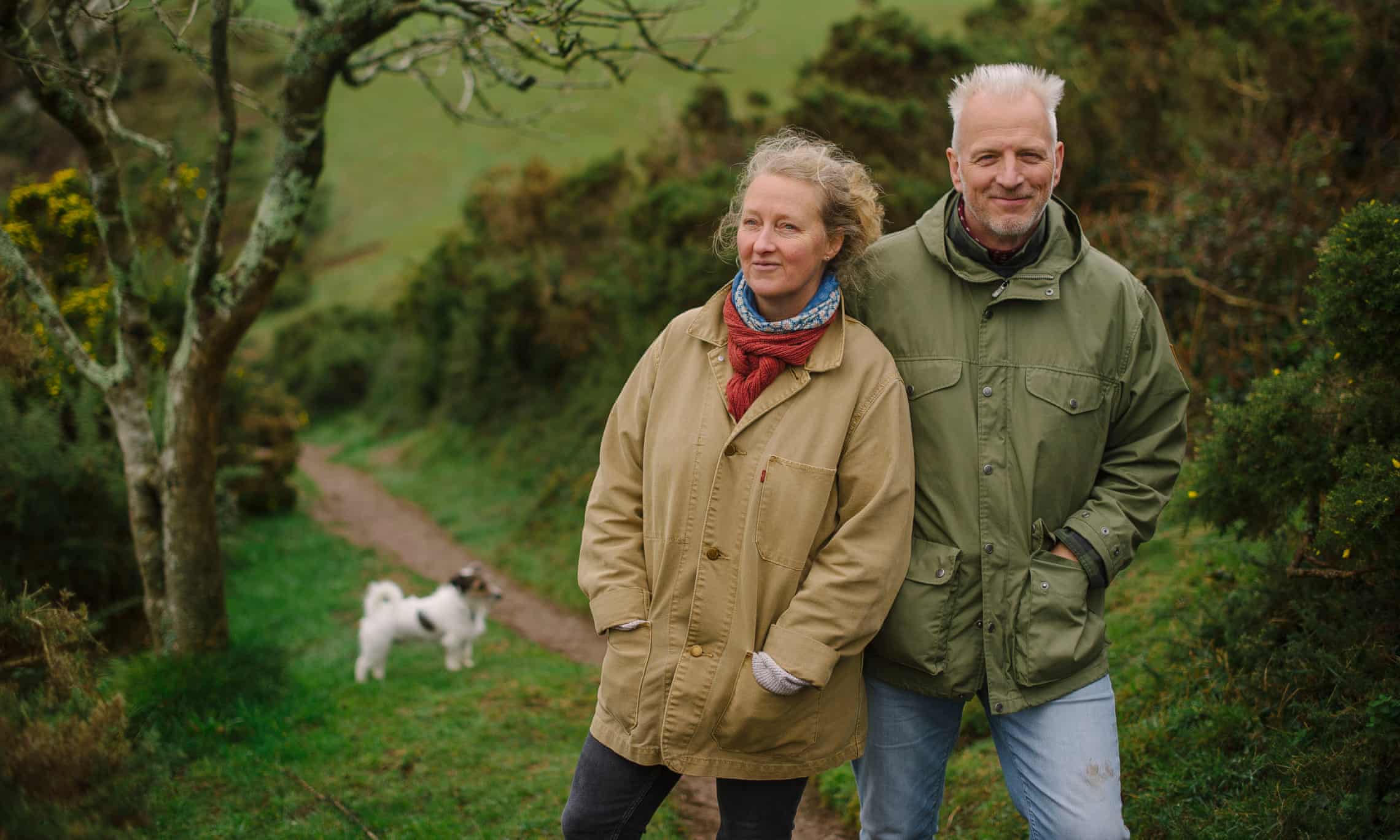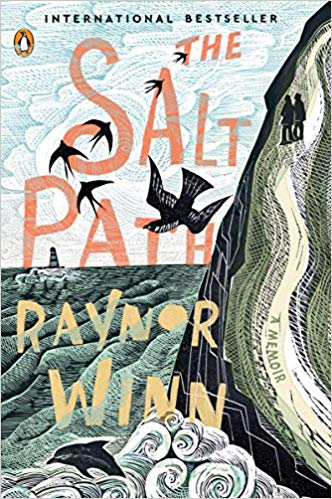Storytelling for the Common Good:
Telling our Stories, Sharing the Wisdom
‘Home is a state of mind. You don’t need walls’: The Story of Moth and Raynor Winn, as told by Sam Wollaston, a Guardian feature writer*
‘Facing homelessness and terminal illness, Raynor Winn and her husband decided to walk the 630-mile South West Coast Path. Raynor talks about that time and the Costa-nominated memoir their experience inspired.’

Raynor Winn, in Polruan, Cornwall, with her husband, Moth, and their dog Monty. Photograph: Jim Wileman for the Guardian
‘On a Thursday afternoon in August 2013, Raynor Winn and her husband, Moth, set off from Minehead in Somerset to walk the 630-mile South West Coast Path. She was 50, he was 53. They had a tent bought on eBay, a couple of cheap, thin sleeping bags, £115 in cash and a bankcard with which to draw out the £48 a week they were due in tax credits. They were broke and broken.
Through a combination of bad decisions and bad luck – a friend who turned out not to be a friend, and a toxic investment – they had lost the farmhouse that was their home and their source of income – renting to holidaymakers. It was also the place where their children had grown up and to which they returned during university holidays.
When the bailiffs came banging on the door, it seemed things could not get worse. But the bombshells didn’t stop. Around the same time, Moth was diagnosed with a rare degenerative brain disease, CBD. The specialist told him that death usually comes six to eight years after the onset – and that he had probably had it for about six years. “You can’t be ill, I still love you,” Raynor told the man with whom she had been since sixth-form college.
The idea of walking the coast path came to Raynor when she spotted a book she had read in her 20s in one of their packing cases. Five Hundred Mile Walkies was written by a man who had done the South West Coast Path with his dog. The walk gave Moth and Raynor some sense of purpose, and, she says: “We really didn’t have anything better to do.”
Their journey – which they split over two summers, wintering in a friend’s shed – ended a year later, in Polruan, Cornwall, with an offer from a kind stranger of accommodation – a flat at the back of an old chapel. That is where I have come today, over on the little ferry from Fowey, bearing well-wrapped fish and chips.
Moth is not here – he has gone for a walk. He is not as well as he was when they finished the big trek in summer 2014 (walking all day, with a big pack, kept his physical and mental deterioration at arm’s length), but he is still here, and still walking. He can have his fish and chips later, heated up, says Raynor. There is a microwave, plus a cooker, fridge, washing machine, pictures on the walls … and a kettle. She makes tea. On the coast path, they scrounged hot water and shared teabags. On a few indulgent occasions, they shared a bag of chips.’...Continue to read
*This article was first published in the Guardian on 6 December 2018
Read the Book
The true story of a couple who lost everything and embarked on a transformative journey walking the South West Coast Path in England
THE SUNDAY TIMES TOP 10 BESTSELLER & SHORTLISTED FOR THE 2018 COSTA BIOGRAPHY AWARD & WAINWRIGHT GOLDEN BEER BOOK PRIZE 2018

Photo:amazon.com
'The landscape is magical: shape-shifting seas and smugglers' coves; myriads of sea birds and mauve skies. Raynor writes exquisitely . . . It's a tale of triumph: of hope over despair; of love over everything . . . home was no longer about bricks and mortar. It was a state of mind' The Sunday Times
Just days after Raynor learns that Moth, her husband of 32 years, is terminally ill, their home is taken away and they lose their livelihood. With nothing left and little time, they make the brave and impulsive decision to walk the 630 miles of the sea-swept South West Coast Path, from Somerset to Dorset, via Devon and Cornwall.
Carrying only the essentials for survival on their backs, they live wild in the ancient, weathered landscape of cliffs, sea and sky. Yet through every step, every encounter and every test along the way, their walk becomes a remarkable journey.
The Salt Path is an honest and life-affirming true story of coming to terms with grief and the healing power of the natural world. Ultimately, it is a portrayal of home, and how it can be lost, rebuilt and rediscovered in the most unexpected ways.
'The Salt Path is a life-affirming tale of enduring love that smells of the sea and tastes of a rich life. With beautiful, immersive writing, it is a story heart-achingly and beautifully told.' Jackie Morris
